The integration of power and machinery has revolutionized production, yet misinterpretations abound regarding its impact on unemployment and societal wealth.
Let’s unravel these misconceptions, explore the intricacies of economic control, and seek solutions for an equitable future

The Role of Power and Machinery in Unemployment
- Effects of Power and Machinery on Unemployment:
Unemployment isn’t caused by power and machinery; instead, it streamlines production, reducing labor and time. However, other factors trigger unemployment. - Societal Benefits of Machinery:
Machinery benefits all classes by augmenting annual wealth creation. - Misconceptions on Machinery and Depression:
It’s fallacious to blame machinery for the current economic downturn; such claims stem from misguidance. - Potential Wealth Amidst Growing Poverty:
Despite advanced technology, poverty surges annually, suggesting a disconnect between potential and reality.
Explore the groundbreaking insights in Frederick Soddy’s “Wealth, Virtual Wealth and Debt” to understand the complex interplay between real wealth and financial systems.
Identifying the Root Causes of Economic Contradictions
- Unraveling the Economic Paradox:
The prevailing contradiction—idle factories, underutilized goods, impoverished citizens—begs introspection into our economic state. - Determinants of National Wealth Production:
Wealth production hinges on resources, efficient plants, skilled labor, and people’s purchasing capacity. - Accountability for the Prevailing Conditions:
The blame rests with those controlling the currency volume, hindering full production and distribution.
Reforming the Monetary System for Equitable Wealth Distribution
- Reforming the Money System:
Adopting an honest, scientific money system aligned with the Constitution can achieve full employment and equitable price levels.
Discover the intriguing concepts in Gertrude M. Coogan’s “Money Creators” and gain a fresh perspective on the origins and control of money in our economy.

Discussion on Fiat Money, National Credit, and Profit Dynamics
Fiat Money Misinterpretation:
All money is fiat money; the focus should be on accepting the honest fiat of the United States.
National Credit and Its Misuse:
The government possesses the power to issue debt-free money for equitable price levels but resorts to borrowing bank-manufactured money.
Understanding Profits and Their Necessity:
Profits should rightly reward property owners and savers while sustaining private property rights.
Unraveling Inflation, Deflation, and War Economics
Understanding Inflation and Deflation:
Inflation and deflation distort the money supply, impacting purchasing power.
Misuse of Money in Wars:
Private individuals financing wars control the narrative, signaling that international bankers hold the War Power.
National Credit and Government’s Role in Money Creation
Does the National Government possess the authority to generate money and maintain stable price levels?
Indeed, the National Government holds the power to create adequate United States currency to ensure fair pricing.
It also has the ability to borrow a portion of the nation’s genuine savings from its citizens to address national expenditures.
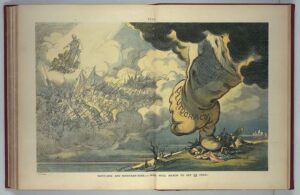
The Cycle of Money Creation
Once this sufficient volume of money is introduced into circulation and equitable price levels are achieved, the subsequent yearly increments become relatively small.
The currency remains in circulation indefinitely, unless removed through taxation.
Worn-out or damaged paper money gets replaced with identical amounts of new currency.
Borrowing Genuine Savings
Is the government borrowing genuine savings from its citizens to fund national needs?
Presently, the government doesn’t borrow the authentic savings of the people; instead, it borrows money manufactured by banks.
The fundamental distinction between the government’s right to issue sufficient debt-free money and its borrowing practices post-money issuance should be comprehended.
Understanding Profits in Economic Activity
What do profits represent in economic activity?
Profits denote the earnings allocated to owners of farms, mines, and production tools.
These individuals rightfully claim a fair portion of the annually generated wealth. The notion of “production for use and not for profit” can be misleading.
Since 1920, farmers have primarily focused on production for utility rather than profit, a situation that requires reconsideration.

The Role of Profit in Sustainability
Is profit critical for the sustainability of private property rights and individualism?
Production for use coupled with honest profit is essential for upholding private property rights and fostering genuine individualism.
Profits should stand as the rightful remuneration for those who’ve accumulated savings and acquired property titles.
The Significance of Savings
Why are savings important in this context?
Savings play a crucial role in financing new additions to production tools and consumer wealth during the production process.
They are indispensable for sustaining the growth of instruments of production and maintaining the cycle of consumer wealth.
Disregarding genuine profits might pose a threat to both private property rights and the foundational fabric of Christian civilization.
Insights from Prominent Figures on Economic Control
Insights from influential figures highlight the dominance and influence of monetary control in society.
Thomas Jefferson said:
“If the American people ever allow private banks to control the issue of their currency, first by inflation and then by deflation, the banks and corporations that will grow up around them will deprive the people of all property until their children will wake up homeless on the continent their fathers conquered.”
“I hope we shall crush in its birth the aristocracy of the moneyed corporations, which dare already to challenge our Government to trial of strength and bid defiance to the laws of our country.” (From Jefferson’s letter to George Logan, November, 1816.)
“We are completely saddled and bridled, and the bank (the privately owned Bank of the United States) is so firmly mounted on us that we must go where they ill guide.” (From Jefferson’s letter to James Monroe.)
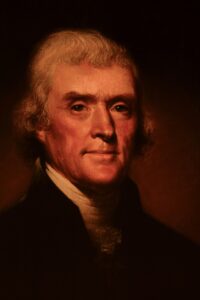
Benjamin Franklin’s Biographer said:
“The most voluminous and systematic of Franklin’s economic writings are his essays defending paper currency.
Holding that the shortage of precious metals in the Colonies hindered trade, lowered land values and prices, encouraged usury, and so benefited the rich speculators at the expense of the working population…” (From “The Amazing Benjamin Franklin“, Page 209, Edited by J. Henry Smythe, Jr.)
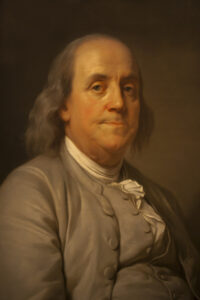
John Adams wrote to Thomas Jefferson in 1787:
“All the perplexities, confusion and distress in America arise,not from defects in their Constitution or Confederation, not from want of honor or virtue, so much as from downright ignorance of the nature of coin, credit and circulation.”
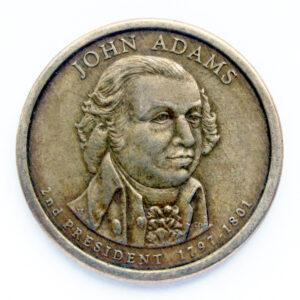
Andrew Jackson said the following words to the money changers who approached him in the drawing room of the White House:
“Gentlemen, I have had men watching you for a long time and I am convinced that you have used the funds of the bank to speculate in the breadstuffs of the country.
When you won, you divided the profits among you, and when you lost, you charged it to the bank.
You tell me that if I take the deposits from the bank and annul its charter I shall ruin ten thousand families.
That may be true, gentlemen, but that is your sin! Should I let you go on, you will ruin fifty thousand families, and that would be my sin!
You are a den of vipers and thieves. I have determined to rout you out, and by the Eternal God, I will rout you out!”
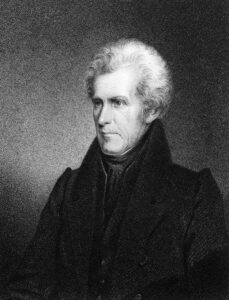
James A. Garfield is reported to have said:
“Whoever controls the volume of money in any country is absolute master of all industry and commerce.”
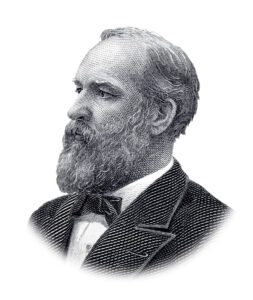
Woodrow Wilson said:
“A great industrial nation is controlled by its system of credit. Our system of credit is concentrated. The growth of the nation, therefore, and all our activities are in the hands of a few men. . . . We have come to be one of the worst ruled, one of the most completely controlled and dominated Governments in the civilized world — no longer a Government by free opinion, no longer a Government by conviction and the vote of the majority, but a Government by the opinion and duress of small groups of dominant men.”
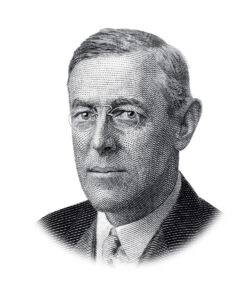
Pope Pius XI said:
“In the first place, then, it is patent that in our days not alone is wealth accumulated, but immense power and despotic economic domination are concentrated in the hands of a few, and that those few are frequently not the owners, but only the trustees and directors of invested funds, who administer them at their good pleasure.
“This power becomes particularly irresistible when exercised by those who, because they hold and control money, are able also to govern credit and determine its allotment, for that reason supplying so to speak, the life-blood to the entire economic body, and grasping, as it were, in their hands the very soul of production, so that no one dare breathe against their will. “
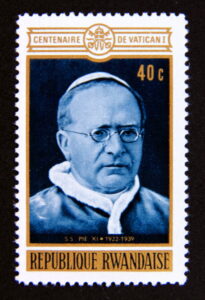
In 1 844 Lord Beaconsfield (Benjamin Disraeli) cited Lionel Rothschild as saying:
“Can anything be more absurd than that a nation should apply to an individual to maintain its credit and, with its credit, its existence as a state, and its comfort as a people.” GREENBACKS: Secretary Chase on the “Greenback”.
“What is a greenback? Did you ever think what it was? Why, it is simply the credit of this great American people put in the form of money, to circulate among the very people whose credit makes it good. When I was Secretary to the Treasury, the question arose, how should these vast armies and navies be supplied?
How should the boys be fed in the field, the sailors in ships, and provisions be made for their support, their clothing, goods and transportation? I found the banks of the country had suspended species payment.
What was I to do? The banks wanted me to borrow their credit, or pay them interest in gold upon their credit. They did not pay any gold, or propose to pay any themselves, but they wanted me to borrow their notes.
I said, no, gentlemen; this great American people is worth all of you put together. I will take the credit of the people, and cut it up in the form of little bits of paper, and we will circulate that paper. This is the true idea of the Greenback. It is the credit and property of the American people.” Salmon P. Chase, Secretary of the United States Treasury under Lincoln.
Henry Ford said:
“The greatest thing in life is experience. Even our mistakes have value for us. Take the matter of money, for example. There is no doubt that financiers have failed to do their best to give us an efficient money system. And yet it was their principal business to do that.
“The function of money is not to make money but to move goods. Money is only one part of our transportation system. It moves goods from man to man.
A dollar bill is like a postage stamp: it is no good unless it will move commodities between persons. If a postage stamp will not carry a letter, or money will not move goods, it is just the same as an engine that will not run. Some one will have to get out and fix it.” — American Magazine, October 1934. Pages 18, 19 and 154.
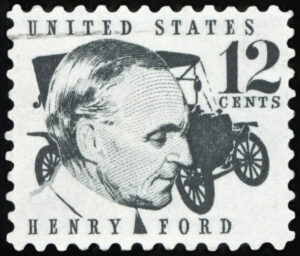
Rothschild’s, International Bankers made the following commitment: London, June 25th, 1863 Messrs. Ikleheimer, Morton and Vandergould, No. 3 Wall St., New York, U. S. A.
“Dear Sirs: A Mr. John Sherman has written us from a town in Ohio, U. S. A., as to the profits that may be made in the National Banking business under a recent act of your Congress, a copy of which an act accompanied his letter.
Apparently this act has been drawn upon the plan formulated here last summer by the British Bankers Association and by that Association recommended to our American friends as one that if enacted into law, would prove highly profitable to the banking fraternity throughout the world.”
“Mr. Sherman declares that there has never before been such an opportunity for capitalists to accumulate money, as that presented by this act and that the old plan, of State Banks is so unpopular, that the new scheme will, by contrast, be most favorably regarded, notwithstanding the fact that it gives the National Banks an almost absolute control of the National finance.
‘The few who can understand the system’, he says ‘will either be so interested in its profits, or so dependent on its favors, that there will be no opposition from that class, while on the other hand, the great body of the people, mentally incapable of comprehending the tremendous advantages what capital derives from the system, will bear its burdens without complaint and perhaps without even suspecting that the system is inimical to their interests’.
“Please advise us fully as to this matter and also state whether or not you will be of assistance to us, if we conclude to establish a National Bank in the City of New York. If you are acquainted with Mr. Sherman (he appears to have introduced the National Banking Act) we will be glad to know something of him. If we avail ourselves of the information he furnished, we will of course make due compensation.
“Awaiting your reply, we are Your respectful servants, Rothschild Brothers.”
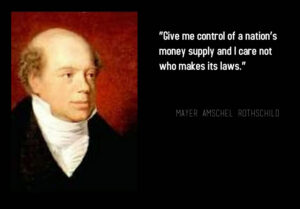
An American International Banker, replies to Mr. Rothschild: Ikleheimer, Morton and Vandergould Private Bankers, Dealers and Brokers in Stocks and Bonds and Gold, and American Agents for the Investment of English Capital Number 3, Wall Street New York City, July 5, 1863 Messrs. Rothschild Brothers, London, England.
Dear Sirs: We beg to acknowledge the receipt of your letter of June 25th, in which you refer to a communication received from the Honorable John Sherman of Ohio, with reference to the advantages and profits of an American investment under the provisions of our National Banking Act.
“The fact that Mr. Sherman speaks well of such an investment or of any similar one, is certainly not without weight for that gentleman possesses in a marked degree, the distinguishing characteristics of the successful modern financier. His temperament is such that whatever his feelings may be they never cause him to lose sight of the main chance.
He is young, shrewd and ambitious. He has fixed his eye upon the presidency of the United States and is already a member of Congress.
He rightfully thinks he has everything to gain both politically and financially (he has financial ambitions too) by being friendly with men and institutions having large financial resources, and which at times, are not too particular in their methods, either of obtaining governmental aid, or protecting themselves against unfriendly legislation.
We trust him here implicitly. His intellect and ambition combine to make him exceedingly valuable to us. Indeed, we predict that if his life is spared, he will prove to be the best friend the monied interests of the world have ever had in America.
“As to the organisation of a National Bank here, and the nature and profits of such an investment, we beg leave to refer to our printed circular enclosed herein. Inquiries by European capitalists, concerning this matter, have been so numerous, that for convenience we have had our views with regard to it put into printed form.
“Should you determine to organize a bank in this City, we shall be glad to aid you. We can easily find financial friends to make a satisfactory directory, and to fill official positions not taken up by the personal representatives you will send over. Your most obedient servants, Ikleheimer, Morton and Vandergould.”
The circular referred to is here inserted: Ikleheimer, Morton and Vandergould Private Bankers, Brokers, Etc.
“We have had so many inquiries of late as to the method of organizing national banks under the recent act of Congress, and as to the profits that may reasonably be expected from such an investment, that we have though best to issue this brief circular as an answer to all questions of our friends and clients “
1. Any number of persons, not less than five, may organize a national banking corporation.
2. Except in cities having 6,000 inhabitants or less, a national bank can not have less than $1,000,000 capital.
3. They are private corporations organized for private gain and select their own officers and employees.
4. They are not subject to the control of State laws, except as Congress may from time to time provide.
5. They can receive deposits and loan the same for their own benefit.
6. They can buy and sell bonds and discount paper and do a general banking business.
7. To start a national bank on the scale of $1,000,000 will require the purchase of that amount (par value) of U. S. Government bonds. 8. The U. S. Government bonds can now he purchased at a 50% discount, so that a bank of $1,-000,000 capital can be started at this time with only $500,000.
9. These bonds must be deposited with the U. S. Treasurer at Washington as security for the national bank currency, that on the making of the deposit will be furnished by the government to the bank.
10. The U. S. Government will pay 6% interest on the bonds, in gold, the interest being paid semi-annually. It will be seen that at the present price of bonds, the interest paid by the government, will itself amount to 12 per cent in gold on all the money invested.
11. The U. S. Government, under the provisions of the national bank act, on having the bonds aforesaid deposited with its Treasurer, will on the strength of such security, furnish national currency to the bank depositing the bonds to the amount of 90% of the face of the bonds, at an annual interest of only ONE per cent per annum. Thus the deposit of $1,000,000 will secure the issue of $900,000 in currency.
12. This currency is printed by the U. S. Government in a form so like greenback money, that many people do not detect the difference, although the currency is but a promise of the bank to pay — that is, it is the bank’s demand note, and must be signed by the bank’s president before it can be used.
13. The demand for money is so great that this currency can be readily loaned to the people across the counter of the bank at a discount at the rate of 10% at 30 and 60 day’s time, making about 12% interest on the currency.
14. The interest on the bonds, plus the interest on the currency which the bonds secure, plus the incidentals of the business ought to make the gross earnings of the bank amount to from 28 to 33%. The amount of dividends that may be declared will de-pend largely upon the salaries the officers of the bank vote themselves and the character and rental charges of the premises occupied by the bank as a place of business. In case it is thought best that the showing of profits should not appear too large, the now common plan of having the directors buy the bank building and then raising the rent and the salaries of the president and cashier may be adopted.
15. National Ranks are privileged to either increase or contract their circulation at will and of course grant or withhold loans as they see fit. As the hanks have a national organization and can easily act together in withholding loans or extending them, it follows that they can by united action in refusing to make loans cause a stringency in the money market and in a single week or a single day cause a decline in all the products of the country. The tremendous possibilities of speculation involved in this control of the money of a country like the United States, will be at once understood by all bankers.
16. National Banks pay no taxes on their bonds, nor on their capital, nor on their deposits. This exemption from taxation is based on the theory that the capital of these banks is invested in U. S. securities and is a remarkable permission of the law, etc.” “Requesting that you will regard this circular as strictly confidential and soliciting any favors in our line that you may have to extend, we are, Most respectfully yours, “Ikleheimer, Morton and Vandergould.”
The Hazard Circular, published by Bankers in Lincoln’s Day says:
“Slavery is likely to be abolished by the war power and chattel slavery abolished. This I and my European friends are in favor of, for slavery is but the owning of labor and carries with it the care of the laborers while the European plan, led on by England, is that capital shall control labor by controlling wages.
“The great debt that capitalists will see to it is made out of the war, must be used to control the volume of money. To accomplish this the bonds must be used as a banking basis.
“We are now waiting for the Secretary of the Treasury to make this recommendation to Congress. “It will not allow the greenback, as it is called, to circulate as money any length of time, as we cannot control that. “But we can control the bonds and through them the bank issues.”
The Economic Undercurrents
Examining economic intricacies reveals profound power dynamics and manipulations shaping global finances.
From the deliberate inflation and deflation orchestrated by private entities to the intricate relationship between financiers and conflicts, it’s evident that economic forces play a pivotal role in societal structures.
Understanding these mechanisms is crucial to comprehend the impact on nations, their currencies, and ultimately, global power dynamics.
